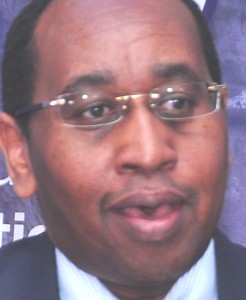Leadership key for policy success in economic groupings
March 13, 2018—Dr. Adam Mugume, the Executive Director, Research and Policy at Bank of Uganda (BoU) has said, national leadership in the regional integration process cannot be overemphasized if these economic groupings are to succeed.
He said presidents need to and have had to step into situations where technocrats and other actors had failed to solve a problem or reach a compromise. “Regional integration is a necessity, but the challenge lies in the role of political leadership in continuing to drive the integration agenda,” he said.
Dr. Mugume was one of the discussants at the Senior Policy Seminar organised jointly by the African Economic Research Consortium (AERC) and BoU early this week.
He wondered whether leaders have learnt from past failures in the second version of the East African Community (EAC) after the first one lasted 10 years between 1967 and 1977. “The first EAC broke up in 1977, because others thought all the industries were dominated by the Kenyans. Have we learnt from our failures, because this never ending try once and try again is insanity.”
The EAC has a GDP of about $188 billion and during the past three years has been the fastest growing economic bloc in sub-Saharan Africa with the latest rate at 5%. However economists say the region can do better with better coordination of policy and less protectionism.
Referring to prevailing wrangles in the East African Community (EAC), Dr. Mugume said the Burundian and Rwandan governments are currently not on talking terms and trade between the two countries has plummeted.
In another instance, the numerous police roadblocks between Mombasa and the common border that used to be a source of deep frustration for Ugandan business people are now no more after President Museveni and President Kenyatta sat down together to thrash out the issue. Subsequently Kenyatta directed removal of all roadblocks.
However turning to the off and on differences between the EAC’s biggest economies, Kenya and Tanzania, over trade in dairy products, gas and cereals, Dr. Mugume queried, “If you are still quarreling about milk under a Common Market how can have integration?”
Seminar participants were drawn from across sub-Saharan Africa, to talk and share ideas about this year’s theme, ‘Rethinking Regional Integration in Africa’. Dr. Mugume said, “Integration has to be seen in the aspect of can we do the implementation? This is what we have to emphasise and build state actors to identify bottlenecks at country level and leadership matters.”
He also pointed to the lack of policy coordination that often leads to duplication of effort and wasted resources. He said there was little harmonisation in provision of tax holidays as Partner States jockeyed to attract foreign investors.
Dr. Mugume said although industrialisation was vital for job creation compared to low-paying agriculture, many EAC projects which were not always grounded in reality. Referring to the trend of setting up vehicle assembly plants and the limited purchasing power, Dr. Mugume said, “Do you start from the car or fix the potholes in the road first? This is where our policies get mixed up.”
He said integration needs, “Clear minds and clear goals with time-spans to know what were aiming at,” he said.


 African Heads of state head to South Korea next week for Summit talks
African Heads of state head to South Korea next week for Summit talks
 Trading leads as main source of income for Ugandans
Trading leads as main source of income for Ugandans
 New leadership for bankers’ umbrella as total assets top $12 billion
New leadership for bankers’ umbrella as total assets top $12 billion
 Brussels Airlines to announce Nairobi service
Brussels Airlines to announce Nairobi service
 SITA promises enhanced travel experience after Materna acquisition
SITA promises enhanced travel experience after Materna acquisition
 Saudia’s 105 aircraft order stretches A320neo lead over rival Max
Saudia’s 105 aircraft order stretches A320neo lead over rival Max
